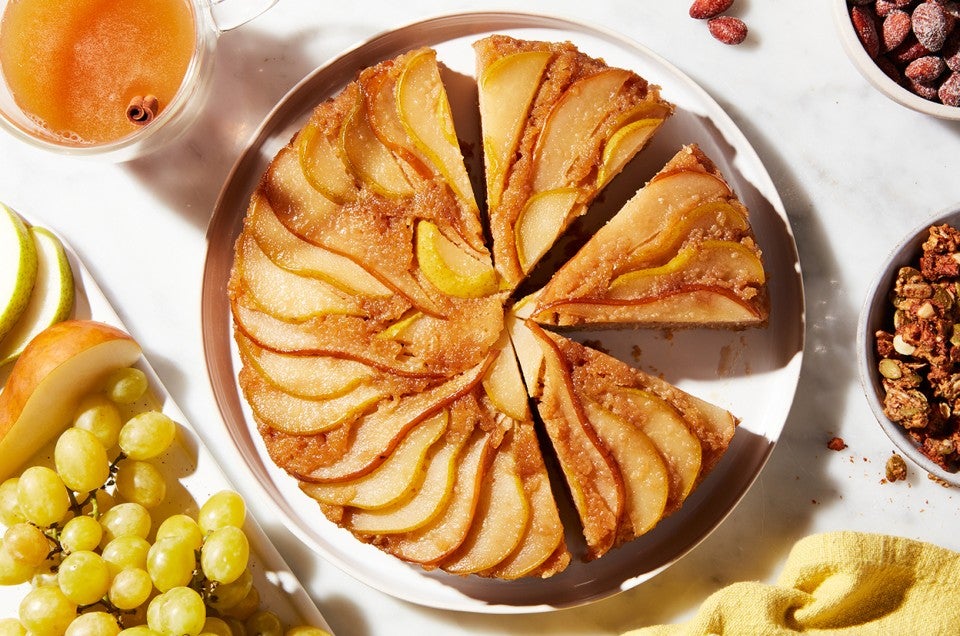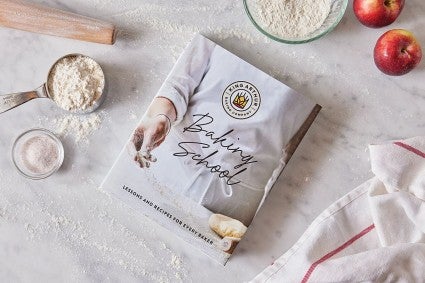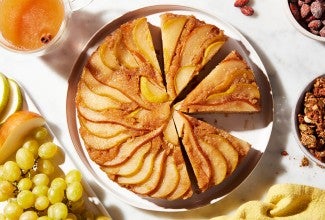This flavor-forward cake is secretly whole wheat — and perfect for fall
A celebratory sneak peek at our newest cookbook.


This week, we released our first brand new cookbook in years: The King Arthur Baking School: Lessons and Recipes for Every Baker. In it, we’ve taken our wildly popular Baking School and transformed its lessons into chapters full of expert advice and mouthwatering recipes. Basically, if you can’t travel to Vermont or Washington to visit the Baking School in person, this book brings the school to you.
To celebrate, we’ve got cake! (What’s a celebration without cake, after all? As Julia Child said, probably just a meeting.) Not just any cake, either — it’s a sneak peek recipe from the book just in time for fall: Maple-Pear Upside-Down Cake.
Like all the recipes in this book, each element has been carefully finessed for maximum success and delicious results. Here’s what makes it great:

All-purpose is a go-to for most cakes. Cake flour, unsurprisingly, is often a good choice. But it’s not too often you find a tender, decadent cake recipe that calls specifically for whole wheat flour. In this case, it’s golden whole wheat flour, a 100% whole grain variety made from hard white wheat for milder flavor.
In this cake, it adds a subtle, nutty flavor that cozies up alongside caramelly brown sugar, spicy ginger, rich maple, and floral pears. White flours like all-purpose and cake flour often serve as blank canvases that let the primary flavor notes of a recipe shine, but in this cake, the flour acts as a flavor enhancer all its own.
Buttermilk isn’t a commonly stocked ingredient, but maybe it should be: It makes fantastic cakes. As Melanie Wanders, one of the bakers behind this book, explains, “The acidity in the buttermilk adds a delicious tang to the cake, balancing the sweetness of the maple-pear topping and what is sometimes perceived as a tannic bitterness from the whole grain flour.” That’s not all — the buttermilk also helps with texture. According to Melanie, “the acids in the buttermilk break down some of the structure-forming gluten proteins, giving the cake a more tender crumb.”
Baker’s tip: If you don’t bake with buttermilk often, stock your pantry with dried buttermilk. It’s always there when you need it, plus it won’t spoil so you only use what the recipe calls for. Learn how to substitute it into recipes in our previous post, Why you should be keeping dried buttermilk in your pantry.
Pears are a delightful and often overlooked fall fruit, which is why it’s so fun that this cake shines a light on their comforting flavor. But if you’re looking to use other autumn fruits, you can make this cake with apples instead. Our Recipe Tester Lydia Fournier tried it and says that using Granny Smith apples is a great way to balance the sweetness from the maple syrup.

You can’t celebrate if half your cake is still stuck to the pan, and in upside-down cakes like this one, that potential for catastrophe is all too real. Thankfully, our skilled Baking School instructors have you covered. They’ve packed this recipe with tips to successfully unmold your cake with barely a crumb left behind:
Prep the right way: Both grease your cake pan and line it with parchment (our favorite way to prevent all cakes from sticking!).
Remove when warm: Be sure to unmold the cake while it’s still warm — if the cake cools too much in the pan, the caramelized fruit topping can stick to the bottom and won’t unmold properly. Before flipping, gently run an offset spatula or knife around the edge of the pan to loosen the cake.
If you’re still having trouble: Cake starting to stick? Pop it back in a warm oven for a few minutes, which returns the caramel to a more fluid state, and try unmolding it again.
This recipe is just one of the many brilliant bakes in the Baking School Cookbook. Order your copy to make them all.

Cover photo (Maple-Pear Upside-Down Cake) by Rick Holbrook; food styling by Kaitlin Wayne.


